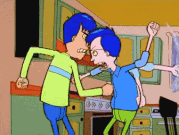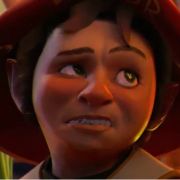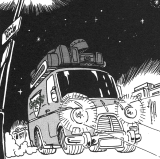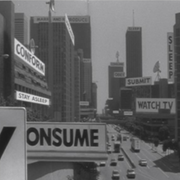|
Covok posted:I'm a little afraid to now. The story is not safe for work. That's kind of embarrassing. sebmojo posted:By Yuna Aeris Nae! posted:Oh man, that takes me back to my first usernames. Brings a tear to my eye... I just want to remind everyone that this happened and that imo it and the subsequent posts are the absolute apex of this thread.
|
|
|
|

|
| # ? May 10, 2024 04:51 |
|
HIJK posted:I just want to remind everyone that this happened and that imo it and the subsequent posts are the absolute apex of this thread. As writers, we'll never surpass the Pringledick, and accepting this is the first step to understanding The Process
|
|
|
|
HIJK posted:I just want to remind everyone that this happened and that imo it and the subsequent posts are the absolute apex of this thread. thanks for remininding me about the time i mathed out a samurai's dick To contribute in a way that doesn't involve dicks, I'm torn on the kill your darlings advice. I think it's good to kill things you love if you can sense they're not working, but there's no point in killing things you love because your love means they must not be working. When revising, I prefer to ask myself two questions of every chapter/scene/line: 1) Is the reader learning something new? 2) Is what they're learning relevant to the story? Every single line in your story can do work if you're always focused on what 'work' needs to be done. Oftentimes, lines can do double-duty and accomplish two things at once. You can have an entire paragraph where you describe a room's basic elements, or you can have a paragraph where you describe how the perspective character views the room based on their moods. A squat, wooden table becomes a lop-sided table they've always hated; an ornate clock on the mantle becomes a dusty gift they feel bad about letting go to waste. In both instances, the same scene is being conveyed, but the second descriptions tell you about both the scene and the character. This isn't just for setting, either. Are you including flashbacks? If you do, include events you can call back to in a meaningful fashion, whether through props or character development. A flashback that shows our character is mean because his mom used to throw plates at him tells us about who he is now, but calling back to that when there's plates around strengthens the original flashback. For transition lines, active verbs are your best friend. Which is more exciting? "I walked across the room and set my boombox on the table, then asked everyone to listen." or "I strode across the room, all young and hip, whipped out my boombox, said Listen to this!" Duh, it's the second one, and not just because the Lonely Island owns. It's because the second one tells you as much about the character as it does the action. Here's how this ties into killing your darlings: if you want each line to do work, you need to make sure the work isn't redundant. You can set a scene by describing a fat man squished into a small chair with rolls of skin pouring over the sides, but if you stay with that man, don't keep harping on his weight. If you set things up correctly, the reader already knows he's thick as hell. This is your opportunity to tell us other things about him. Maybe he's picking his nose while he talks! If he is, don't take the easy way out and say 'he shoved a doughy finger up his nose'; say 'he shoved a blotchy finger up his nose,' or 'he shoved a finger up his nose and dug around with the splintered nail.' Same action, but now the reader knows more. One caveat to all of this: sometimes you need to know when to get out of your own way. It's important to make every line do work, but you also don't need to bloat your story by making every line a symphony. For example, 'he said' is gonna be the best dialogue tag nine times out of ten. The tag's purpose is primarily to identify the speaker, which means you only need them as often as there could be any ambiguity. Throw in superfluous adjectives and you're adding bloat to what is effectively punctuation. You don't need to do that. So yeah, killing your darlings. If your darling is telling your reader something new and that new information is essential in terms of character, scene, or narrative, then you probably don't need to kill it. If it's redundant or superfluous, unsheathe your hanzo steel and rend it in twain.
|
|
|
|
I feel like “kill your darlings” is great advice for beginning writers who think they know more than they do, but the better you get at the craft aspect of writing the less helpful it is. Learning how to self-edit and accepting that it’s okay to cut things are VITAL in the early stages of learning how to write. But in my time editing for more journeyman and up writers, I have found I have to kill comparatively few darlings because they have learned to rein themselves in and they realise that you don’t have to be maximum clever every sentence. I liken it to a comedy movie script–you know those bad, bad comedies where the writers think there just has to be a gag in every single shot and there simply must be a one-liner every other line of dialogue? “Kill your darlings” to me is teaching yourself that you don’t have to do that even if the individual jokes all sound funny and good. It’s about learning that sometimes paring your piece down and not trying too hard works best because the more jokes you cram into a piece of writing, the more it becomes necessary to land every single one lest a few bad ones muddle the momentum of the entire piece.
|
|
|
|
I far prefer saying Don’t Be Precious
|
|
|
|
Stuporstar posted:I far prefer saying Don’t Be Precious This is good
|
|
|
|
What are some personal tropes you employ in your writing? To rephrase: recurring ideas you like to add into your stuff. Fruity20 fucked around with this message at 17:36 on Jul 28, 2019 |
|
|
|
My major project has been overstuffed, trying to have too many ideas for one story. I've known that for a while, but they all fit together so well that it seemed like it would be hard or impossible to remove any without making the whole concept collapse. But reading a reminder on how crappy "rear end-pulls" are in stories made me take a closer look at one element: my protagonist had recurring dreams which seemed to show specific future events leading up to the death of someone (unknown to him until the time my story kicked into gear). No matter how I thought about it, I couldn't think of a satisfactory way to explain the cause of those dreams without, effectively, a last-minute exposition dump/plot twist in the final pages. I couldn't think of a way to properly foreshadow that explanation in a way which was natural to the world my characters lived in. It was essentially an rear end-pull. The only thing left is to just completely yank out that "seeing the future in a dream" element, and all other elements built on it. At the moment it seems like it was surprisingly easy to remove (because due to the nature of the cause, I already needed to think of a way to do it without that element existing). Fruity20 posted:What are some personal tropes you employ in your writing? How will knowing this help you? Tropes are just little bite-sized units of storytelling convention. There are countless numbers of them, and different people like different things.
|
|
|
|
Stabbey_the_Clown posted:My major project has been overstuffed, trying to have too many ideas for one story. I've known that for a while, but they all fit together so well that it seemed like it would be hard or impossible to remove any without making the whole concept collapse. But reading a reminder on how crappy "rear end-pulls" are in stories made me take a closer look at one element: my protagonist had recurring dreams which seemed to show specific future events leading up to the death of someone (unknown to him until the time my story kicked into gear). l meant more like what things do you like adding into your stories.
|
|
|
|
Fruity20 posted:l meant more like what things do you like adding into your stories.  Write what you want, it's YOUR writing. Write what you want, it's YOUR writing.
Stabbey_the_Clown fucked around with this message at 15:48 on Jul 29, 2019 |
|
|
|
Does anyone set out with “tropes” in mind that they plan on using? Seems more like in telling a story you sometimes just have them, some are more cliché than others, and you do your best not to be too obvious about them.
|
|
|
|
Fruity20 posted:What are some personal tropes you employ in your writing? It's not intentional, but I tend to recurringly make old women who are badass and not matronly; I blame Granny Weatherwax and Nanny Ogg from Discworld for this. I know there's tropes I like to AVOID (general problematic poo poo), but it's honestly not like, on purpose, when I use them. I can't really imagine approaching a story with the mindset of "these are the tropes/ideas/etc I intend to hit"
|
|
|
|
I like collective consciousnesses, floating glowy runes, and writing characters who are real rowdy dumbassesStabbey_the_Clown posted:I know what you meant. Same question: how will that help with your writing? You write what you want, it's YOUR writing. Idk dude, sometimes it's just fun to have discussions in the discussion thread?
|
|
|
|
John Cenas Jorts posted:I like collective consciousnesses, floating glowy runes, and writing characters who are real rowdy dumbasses Yes but how does fun help you become a better writer, hmmmmm? Writing isn't about fun; it's about disappointment, despair, and drinking. So get to work!
|
|
|
|
John Cenas Jorts posted:Idk dude, sometimes it's just fun to have discussions in the discussion thread? Fair enough, I guess. I like self-determined, independent-minded women characters. I like systems of magic or pseudo-science which are more grounded and have understandable rules and restrictions. I like protagonists who aren't as physically or numerically powerful and need to outwit their opponents through cleverness. I also like to insert murder mysteries into my science-fiction or fantasy works, even though the murder is not the focus of the main story. I don't care much for Masquerade-style urban fantasy ("It's exactly like our world, except that there's secret magic stuff all over that is top-secret hush hush and also somehow has had no noticeable effect on the mundane world or society"), especially the more different things they throw in. However, the idea of an open urban fantasy ("Bob the orc works in IT Tech support and carpools with Giliad the Elf who is a Web Application Developer") is a much more intriguing setting to me. EDIT: I also like villains who appear to be allies, and - more interestingly, villains who genuinely like the heroes and hope to turn the heroes to their side. I also think villains should often have sympathetic motivations, and sometimes villains could become allies. Stabbey_the_Clown fucked around with this message at 03:49 on Jul 29, 2019 |
|
|
|
Doors that talk and werewolves
|
|
|
|
Angels, disgruntled magic realist sararimen and the 2008 toyota caldina station wagon
|
|
|
|
Characters who have powers and responsibilities that far outstrip their competence, affable and down-to-earth horrifying monsters, and protagonists getting visibly annoyed with how stupid their circumstances are.
|
|
|
|
I had a realization last week that I probably spend way too much time in my writing talking about the ephemera of people's domestic lives: the meals they eat, the junk in their houses, and stuff like that. Mostly I wish I'd realized this before I wrote a nothingburger of a TD story heavily involving IKEA light fixtures, but oh well. EDIT: Also I write way too many stories about unattractive and/or sad characters trying to get validation that they are or can be loved, because I have personal problems, I guess?
|
|
|
|
Stabbey_the_Clown posted:I know what you meant. Same question: how will that help with your writing? You write what you want, it's YOUR writing. Discovering your obsessions and preoccupations via your own writing can give you useful material to lean into, subjects to explore. If you don't, then these things are going to crop up in your writing anyway, beyond your conscious control.
|
|
|
|
I like to write about silly things happening, p. much. I probs have a bunch of more specific things, but mostly it's just silly happenings. I also like to mix the mundane and the fantastic in fun ways.
|
|
|
|
There is no story that could not be made better by a talking dog and/or cat as the protag's buddy.
|
|
|
|
Stabbey_the_Clown posted:I know what you meant. Same question: how will that help with your writing? You write what you want, it's YOUR writing. Aggressive much? The tropes I utilize are usually related to what I'm reading. If I'm reading a mystery novel involving eccentric characters, or a sci-fi novel where the narrator breaks out a "Bartholomew", then the two merge to form a eccentric character named bartholomew. Just whatever I catch based off of what I am consuming?
|
|
|
|
On the subject of "killing your darlings", I try to look at my own work as critically and objectively as possible (which means I can suffer from excessive perfectionism). I have a "darling" in a plot twist. I looked at it and saw that it wasn't really supported well. I tried to kill it, I really did. But the collateral damage means that some dilemmas my characters faced no longer exist, and so neither do certain difficult choices they had to make. I determined that I could certainly tell the story without that darling, but without it driving my characters, many scenes would lose their punch. I am pretty sure that this story is doomed thanks to my attempts to bite off more than I can chew, but I might as well see if anyone has suggestions. I've gone back and forth on whether it's stupid to spoiler-tag this (and I think it probably is). Tags are almost certainly unnecessary, I have no fear anyone is going to steal the idea (nor do I care if they do). Maybe I'll delete the tags later. I was thinking about the movie "Back to the Future". In BttF, Marty-Original goes to 1955, fucks up his parents first meeting, spends the movie fixing it, and that creates an alternate universe, so he returns to 1985-A, which is different than the one he remembered. After Marty-Original left 1955, time continued onwards, Marty's parents got married, and Marty-A was born, and Marty-A continued to live his life, accumulating memories of 1985-A... right up until the point where Marty-Original returned from 1955. At that point, Marty-A ceased to exist. He was replaced with Marty-Original, his duplicate who had different experiences and memories than Marty-A had. From that, came the notions "what if the protagonist was not Marty-Original, but Marty-A" and "what if the ripples from the original change affected Marty-A's life"? EDIT: I was probably being unclear. I only used that idea as a jumping-off point for my own thought process for a story concept, it doesn't bear that much resemblance to BttF or even use the same rules. For my world, I came up with a few solid rules for time-travel. The first is that no matter can travel back in time. You can't go step into a machine and come out in the past, or take a machine backward and go gently caress around. The only thing which can go back is a signal, a message (the pseudo-science reasoning is that it's the manipulation of certain hypothetical particles which travel faster than light). (I suppose I should also watch the movie Frequency which I think did something like this.) The second rule is that only a certain device can detect this signal, so the signal, in essence, cannot be sent back farther in time than the creation of a device which can detect the signal. The long-dead scientist who created the device tried to find a way so that the signal could be detected at a point before the device was created, but failed, so the device ended up being useless for the purpose he created it for. The third rule is that the signal has to be sent back to a specific point in time, My protagonist is standing by the "receiving device" and gets a message from the future which, due to damage to the device, is garbled and not fully understood. Starting from that point, they are essentially "Marty-A", seeing information from "Marty-Original", which immediately starts them on a diverging path from "Marty-Original", so the information they do understand becomes less precise, but because they're following that information, they're still headed towards about the same place anyway. This world is at roughly technology from the year 1900, obviously the time-communication device is far, far more advanced. Messages from the future would seem either a preposterous notion, or to certain people as prophecy from the gods. My vision-receiving protagonist is an atheist who doesn't believe in prophecy or destiny. The second character is a believer in the gods and destiny, but not that the protagonist is a prophet. My problem is that I don't really know how I can properly foreshadow this stuff so that when I finally spell out the explanation, it won't feel like it came out of nowhere. Stabbey_the_Clown fucked around with this message at 15:13 on Jul 31, 2019 |
|
|
|
Stabbey_the_Clown posted:On the subject of "killing your darlings", I try to look at my own work as critically and objectively as possible (which means I can suffer from excessive perfectionism). I have a "darling" in a plot twist. I looked at it and saw that it wasn't really supported well. I tried to kill it, I really did. But the collateral damage means that some dilemmas my characters faced no longer exist, and so neither do certain difficult choices they had to make. I determined that I could certainly tell the story without that darling, but without it driving my characters, many scenes would lose their punch. It sounds like a neat premise. I would go ahead and "just write" it, and see how it goes. The start sounds a lot like Stein's Gate, including the Stein's Gate Spoilers ahead the garbled message and who sent it.. Stein's Gate 0 sounds more up your alley if you ever need inspiration. Foreshadowing could be Character_2 mentioning locations that are just being created, then being mystified when they change names (Think Twin Pines mall). There are a lot of ideas though, which one is the darling?
|
|
|
|
Exmond posted:It sounds like a neat premise. I would go ahead and "just write" it, and see how it goes. I'm still going to write the story, if only to flush it out of my head so I have the experience of writing a full novel-sized work. quote:The start sounds a lot like Stein's Gate, including the Stein's Gate Spoilers ahead the garbled message and who sent it.. Stein's Gate 0 sounds more up your alley if you ever need inspiration. The idea of names being changed, that's given me an idea. (The "Twin Pines" thing might not be applicable exactly, as the time-span the message covers is a matter of months.) The protagonist receives the message five years before it becomes relevant. Because the original sender can only send a message and not physically alter events, the biggest thing they affect happens inside the protagonist's head (which is really all you need for a story). Still, I think you might have unstuck me. I originally was planning on having only the images part of the message getting through, not the audio, due to specific damage on the "receiver device" (and only after finding the other device at the end can my protagonist see the entire original message with audio). (Side note: I just remembered that I can't use my "rule 3" above, I need a recording to be seen at the end.) I thought I had to do it that way because hearing the audio would essentially give away the mystery completely. Even using the appropriate past tense would be a giveaway ("We went..."). Maybe, though, if I think about it really hard, I can find a way to pass some information along.
I think this was quite helpful, thanks. Getting a fresh perspective is great for inspiring or getting unstuck. quote:There are a lot of ideas though, which one is the darling? A person cannot change the past for himself, so sends a message to a past version of himself so that in at least one universe, the death of someone he cared about can be averted, but the past version doesn't understand what the message is. Stabbey_the_Clown fucked around with this message at 19:14 on Jul 30, 2019 |
|
|
|
Stabbey_the_Clown posted:My problem is that I don't really know how I can properly foreshadow this stuff so that when I finally spell out the explanation, it won't feel like it came out of nowhere. Do you really need the explanation? Why not provide enough clues (N) for the reader to figure it out, and forgo the explanation entirely. If you want to generate further reader discussion, provide N-1 clues. It's not an absurdly complex set-up, and if you mean (by the message becoming less precise) that the message changes because Marty-Original is being diverged from, then you can indicate that by the message literally changing (and then Marty -Q when its finally time to send them message, assuming he sent it, wondering if its even necessary at this point. Or something... depending on your other internal rules). But the point is you can reveal the rules through their operation, rather than needing an exposition dump at the end. The only other thought I had was Audio (as in voice) is a pretty complex signal to send anyway, though less scomplex than imagery which is why morse code was invented first, then radio, then television.Voice wasn't even sent by Radio until 1900 in our timeline. Obviously this is totally handwaveable for your device's purposes, though. Fumblemouse fucked around with this message at 23:55 on Jul 30, 2019 |
|
|
|
My thought on writing time travel is this: no matter what you do, your theory will have a hole in it somewhere, so don't sweat the details too much because it's invariably going to fall apart under scrutiny.
|
|
|
|
Isn’t the whole point of time travel stories that they’re paradoxical? Or that there is no actual changing of the timeline?
|
|
|
|
The twist (and the general concept of immutable time) is somewhat reminiscent of 12 Monkeys. Not that that's a bad thing! Just be aware that there's another similar thing out there and be prepared for comparisons.
|
|
|
|
It depends entirely on what the author wants to make the time travel story about. There are stories involving time travel that are completely dream logic and that's fine because they're not meant to be evaluated logically.
|
|
|
|
Stabbey_the_Clown posted:I'm still going to write the story, if only to flush it out of my head so I have the experience of writing a full novel-sized work. Yeah I wouldn't kill this darling, everything else surrounding it is up for grabs, but it sounds like this is what YOU want to write. This is your story so go for it. More brainstorming then suggestions, but are you going to have a switching POV? Some dude sacrificing his whole timeline for a loved one sounds amazing, especially if everyone in that timeline is aware of what's going to happen.
|
|
|
|
Fumblemouse posted:Do you really need the explanation? Why not provide enough clues (N) for the reader to figure it out, and forgo the explanation entirely. If you want to generate further reader discussion, provide N-1 clues. Maybe by the time I have written the story in full all the way to that point, I won't need to spell the explanation out. Right now, though, I believe that I do need at least part of the explanation because it's not a very intuitive thing to grasp. Most stories using time-travel tell it from the Marty-Original perspective, or at least someone who is aware of the existence of time-travel. My main character, Marty-A (not-actually-to-be-named-Marty) will be completely unaware of the existence of time travel (in fact, there are no living characters who are aware of it) and thus won't understand the source of the message he received. I do want to have to explain as little as possible at the last moment and properly foreshadow it, though. I probably want to put in some notes from the original scientist who made the device (which will also need some translation) throughout the book. I'm not fond of the idea of leaving what happens as out of the text so that the reader reaches the end and doesn't know what happened or why, but that might just be a result of my fondness for detective stories. quote:It's not an absurdly complex set-up, and if you mean (by the message becoming less precise) that the message changes because Marty-Origianl is being diverged from, then you can indicate that by the message literally changing (and then Marty -Q when its finally time to send them message, assuming he sent it, wondering if its even necessary at this point. Or something... depending on your other internal rules). But the point is you can reveal the rules through their operation, rather than needing an exposition dump at the end. It will be noticed that the message is diverging from what is actually happening, which will raise questions about its accuracy and use as a prediction, and some debates about whether following it at all is a good idea. There are additional story complications and problems Marty has unrelated to the message which make following it more tempting. EDIT: The message itself will not be changing no matter how it differs from what happens in Marty-A's timeline. As for whether Marty-A sends the message, or whether Marty-A needs to send a message, that could very well depend on whether Marty-A learns enough from the message or not. quote:The only other thought I had was Audio (as in voice) is a pretty complex signal to send anyway, though less scomplex than imagery which is why morse code was invented first, then radio, then television.Voice wasn't even sent by Radio until 1900 in our timeline. Obviously this is totally handwaveable for your device's purposes, though. Indeed, what Exmond has just helped me realize is that I don't need audio, or even moving pictures. All I'll really need are still images and text (which the receiver can output as speech through text-to-speech). Those limitations will help. Nae! posted:My thought on writing time travel is this: no matter what you do, your theory will have a hole in it somewhere, so don't sweat the details too much because it's invariably going to fall apart under scrutiny. Probably, which is one reason why it is so heavily limited in my story, and why it isn't actually the story's focus. Phil Moscowitz posted:Isn’t the whole point of time travel stories that they’re paradoxical? Or that there is no actual changing of the timeline? It’s kinda the latter. I’m taking a “branching multiverse” approach here. Marty-Original's past is fixed, nothing he does can change his own past, and he knows this. The only thing he can do is try and create a new branch where Marty-A has a chance to change things and hopefully things will turn out better for Marty-A than they did for him. Marty-Original will never know the outcome of his attempt to change things. Mirage posted:The twist (and the general concept of immutable time) is somewhat reminiscent of 12 Monkeys. I saw that movie a long time ago, but since the setting, characters, and disaster they’re trying to prevent are quite different, I think it’s different enough to avoid being called a rip-off of 12 Monkeys. I'm also not using a "single immutable timeline" premise. Marty-A's future is not fixed, and could easily be changed at any time if he decided to stop following where the message is leading him. Exmond posted:Yeah I wouldn't kill this darling, everything else surrounding it is up for grabs, but it sounds like this is what YOU want to write. This is your story so go for it. I have indeed been thinking of having some scenes set from “Marty-Original’s” PoV, but doing those scenes without making the twist clear could be tricky, even with him using an assumed name. Said “Marty-Original” scenes would be set several decades after the main story, so there’s also the trick of balancing hinting at a different time by showing more advanced technology, without making the reader think I’m just loving up my own setting. I'm not sure if I'll actually end up putting in any scenes from the PoV of Marty-Original, because while technically he started the events of my story in motion, it's not actually his story. Marty-Original is sacrificing a lot, but not his own timeline. That will carry on independently of Marty-A's timeline. I referenced Back to the Future as shorthand. It's a jumping off point for my thought process, but I'm not using that universe's rule set. Stabbey_the_Clown fucked around with this message at 00:50 on Jul 31, 2019 |
|
|
|
In Blood Meridian, Cormac McCarthy essentially spoils the major plot in the chapter subtext. How was he able to make that work? It would seem trying to find out what happens would take the punch out of reading, yet he manages to keep the readers engaged. If you're trying to mimic the format, what are some pitfalls that should be avoided?
|
|
|
|
Spoilers are a made up nonsense thing.
|
|
|
|
Bioshuffle posted:In Blood Meridian, Cormac McCarthy essentially spoils the major plot in the chapter subtext. I'm not familiar with that work, but if it's in the subtext, what's the difference between that and foreshadowing? Or by subtext, do you mean a heading under the chapter number/title? Stabbey_the_Clown fucked around with this message at 21:37 on Aug 2, 2019 |
|
|
|
If spoilers really affected enjoyment, no-one would ever re read anything. What happens matters a bit, but how it happens is why you read.
|
|
|
|
Stabbey_the_Clown posted:I'm not familiar with that work, but if it's in the subtext, what's the difference between that and foreshadowing? Or by subtext, do you mean a heading under the chapter number/title? Every chapter header has a list of things that happen in that chapter. But I think they’re generic enough that they just pique the reader’s interest and don’t spoil anything. I’m actually re-reading Blood Meridian again right now, and to me, when I read those chapter headers, they don’t mean much. Also, Blood Meridian is about so much more than the plot. I would even argue that the “plot” is maybe the fourth or fifth most interesting thing about the book. But seriously OP, don’t bother trying to emulate Cormac McCarthy.
|
|
|
|
I've seen that chapter subtitle thing done elsewhere, in Eric Flint's "Forward the Mage" and Terry Pratchett's "Going Postal". Forward the Mage takes that and goes absurdly over the top so that at a certain point, the "subtitle" becomes so long and complex that it actually completely replaces the chapter. There are a few chapters like that in a row before things go back to "normal" (as you might have guessed, it's a very strange book). Those "chapters" act as a sort of time skip during a travel sequence. A better model would be Going Postal. The chapter subtitles say what happens, yes, but it's not a spoiler because of a thing known as context: there isn't any without actually reading the chapter. Read that book and see how the chapter subtitles work there to tease things, yet fail to provide enough information to spoil the events.
|
|
|
|

|
| # ? May 10, 2024 04:51 |
sebmojo posted:If spoilers really affected enjoyment, no-one would ever re read anything. What happens matters a bit, but how it happens is why you read. This is how I think too. It's really annoying online to see people so wound up over spoilers.
|
|
|
|






















